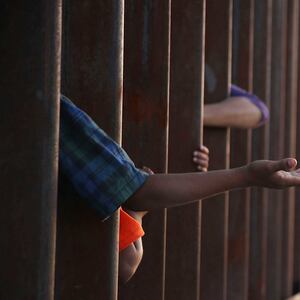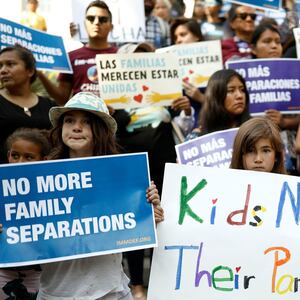Thousands more migrant children were separated from their parents by the Trump administration than was previously known—and the authorities don’t know what happened to many of them, a government watchdog said Thursday.
The inspector general for the Department of Health and Human Services released a report concluding that the government took thousands of migrant youths away from parents who crossed the U.S. southern border before the “family separation” policy was formally instituted in spring 2018. That’s on top of the approximately 3,000 children separated from families over the summer under the policy that was withdrawn after national condemnation. But separations didn’t completely stop, the report found, having continued at a reduced rate for the rest of the year.
“We don’t have any information on those children who were released prior to the court order,” an official from the HHS Office of Inspector General said on a call Thursday, noting that “more children over a longer period of time” were separated.
ADVERTISEMENT
“How many more children were separated is unknown, by us and HHS,” the investigator added.
“This policy was a cruel disaster from the start,” Lee Gelernt, lead attorney and deputy director of the ACLU’s Immigrants’ Rights Project, said in a statement. “This report reaffirms that the government never had a clear picture of how many children it ripped from their parents. We will be back in court over this latest revelation.”
In the last days of the Obama administration, 0.3 percent of all underaged undocumented children were reported separated from their parents. That figure jumped to 3.6 percent by August 2017 under the Trump administration, the report found—an eightfold increase.
Customs and Border Patrol ran a “pilot program” of separating families before implementing Trump’s widespread zero-tolerance policy, NBC News previously reported. At least 1,768 children were separated from their parents between October 2016 and February 2018 in the El Paso, Texas sector of the border, NBC reported.
Trump ended the formal family separation policy on June 20, 2018. Six days later, a federal judge ruled in a class-action lawsuit against the government by separated parents that families be reunited. More than five months later, the government has still not reunified all the families, the inspector general’s report said.
At the time of the court order, at least 2,816 children were reported separated from their families. After the order, 2,131 children were reunited with their parents and another 526 were released to another party. Another 159 children remained in government care.
Since the end of the formal policy in July, more than 100 children have been separated, investigators found.
Overall, the report said the federal government still doesn’t know how many children have been separated or how many children were reunified with parents. In part, that’s because staff at the Department of Homeland Security were informally tracking separations in 2016 (on an Excel spreadsheet). Migrant children were released by DHS into the custody of HHS’s Office of Refugee Resettlement.
But officials had, and still have, “significant challenges in identifying separated children” retroactively, according to the audit. In fact, according to the report, “it is not yet clear whether recent changes to [the government’s] systems and processes are sufficient to ensure consistent and accurate data about separated children.”
This audit will be followed by others, including ones that will look at the wellbeing of children who still reside in these facilities, and, according to the report, “Future work will address facilities’ efforts to protect all children in their care from harm and to provide needed physical and mental health services, including efforts to address trauma.”







